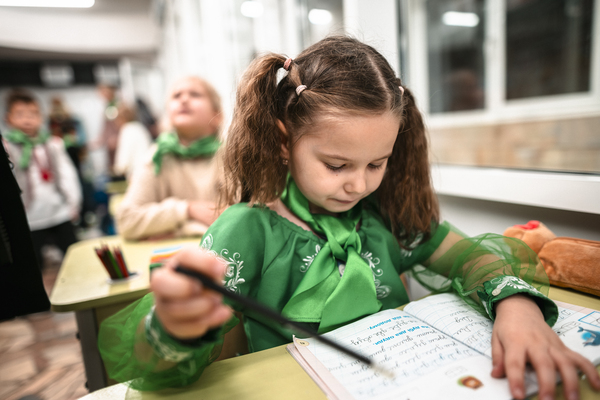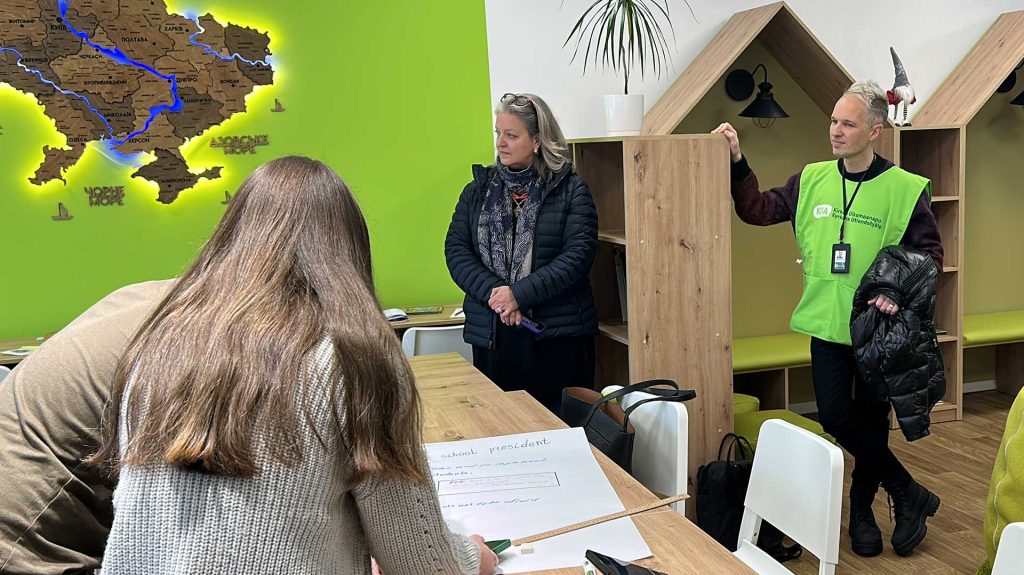FCA’s work continues in Ukraine and expands to vocational education and training
In two years, the war has damaged 3,428 educational institutions and destroyed 365 schools in Ukraine. Over the past two years, Finn Church Aid has supported the schooling of Ukrainian children and young people, for example by providing shelters and psychosocial support.
The work continues in schools such as those set up in Kharkiv metro stations and has been extended to vocational education over the past year.
24TH FEBRUARY marks two years since the start of Russia’s war of aggression in Ukraine. The war has affected the lives of 7 million Ukrainian children and young people. In total, 3,428 schools and other educational institutions in Ukraine have been damaged and 365 have been destroyed beyond repair in the last two years (Source).
Finn Church Aid’s (FCA) humanitarian aid mission in Ukraine began shortly after the war broke out. Work is ongoing, particularly to safeguard education. FCA’s work in Ukraine includes building and equipping bomb shelters to protect education even during air raids, strengthening the skills of education professionals and psychosocial support for children, and supporting digital learning opportunities.
“Over the past two years, we have laid the foundations and built the networks to be known in Ukraine as a supporter of education,” said Ikali Karvinen, FCA’s Deputy Executive Director, who visited FCA’s areas of operation in Ukraine in early February.
Schooling in the middle of war requires special solutions such as underground metro schools
In Kharkiv, for example, the FCA has been working hard to ensure that more children have access to psychosocial support. In addition, FCA has supported the underground metro school with EU funding. The school was established in autumn 2023 and FCA has purchased materials and offered psychologists training so that they can provide psychosocial support lessons fo children. Kharkiv, in the east of Ukraine, has been the target of constant aerial bombardment since the beginning of the war, making it impossible to attend school under normal conditions.
The Kharkiv metro school now operates in two shifts. However, the metro school, with over a thousand pupils, is only a first aid measure in a situation where 110,000 children and young people from Kharkiv are enrolled in primary education.

Access to classroom teaching is particularly important for young pupils. 6-year-old Yulia Yurova is one of the first to start school thanks to the metro school.
“I’m happy that my child was able to start local education from the first grade. It’s much more than I could give her as a mother in home education. My child is talkative and likes to be with other children. She is always eager to go to school,” says Natalia Yurova, mother of Julia.
According to the authorities, only about half of children and young people in Kharkiv attend school, which, with the exception of the metro school, is mainly distance learning. Many families in Kharkiv have been forced to flee abroad or to other parts of Ukraine, cutting off schooling for months or even years.
FCA’s work extends to vocational education and training
According to Deputy Executive Director Karvinen, work will continue in the long term in existing and new geographical areas. In Ukraine, FCA works in regions such as Kharkiv, Chernihiv, Zhytomyr and Kyiv.
“We will continue our work to ensure that children’s right to education is fulfilled and that schools have access to the necessary educational equipment and safe facilities,” says Karvinen.

According to Karvinen, digital learning environments will be particularly important in the future. FCA has extended its work from basic education to vocational education and training.
“We are particularly interested in cooperation between companies and educational institutions,” says Karvinen.
Supporting education in a crisis context has two simultaneous objectives. Schools create a safe space for children to learn, deal with emotions and connect with other people. They also serve as a starting point for reconstruction.
“Only educated children and young people will be able to support society later on in the huge reconstruction needs that Ukraine will face as a result of the war,” says Karvinen.
“School creates hope both for today and for the distant future. An educated child is the engine that will help society change and overcome the crisis.”
Read more about the underground metro school.
For more information:
Deputy Executive Director, Mr. Ikali Karvinen, e-mail: ikali.karvinen(a)kirkonulkomaanapu.fi, tel. +358 40 509 8050